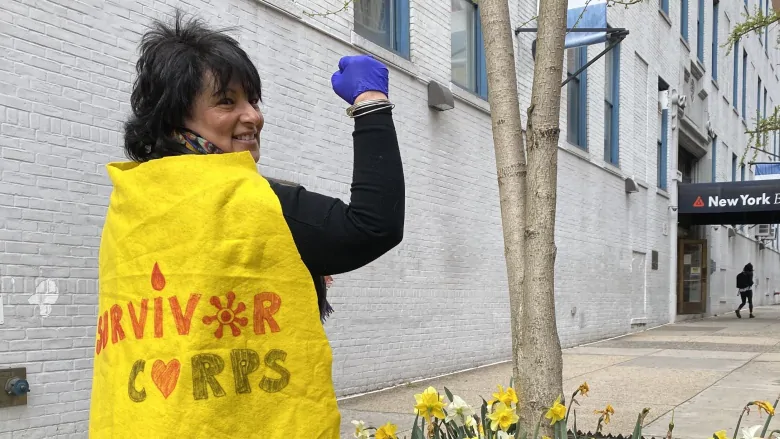Coronavirus survivors are emerging from the illness with powerful antibodies in demand by researchers and physicians across the world. Multiple trials are underway in the U.S., Canada and Europe in the hopes of harnessing the antibodies for convalescent plasma that could benefit sick patients or front-line workers.

Julie Thaler throws a homemade yellow cape stenciled with the words Survivor Corps over her shoulders before striding, nearly skipping, into the New York Blood Center.
Thaler, a kindergarten teacher from Westchester County, was part of the first nasty cluster of people infected with coronavirus in New York. Now fully recovered, she hopes the antibodies she has developed in her blood will help patients or front-line workers fight COVID-19.
“I feel like we’re in a science fiction movie,” she said last Friday. “I am one of the ones walking around with immunity, like a hazmat suit inside my body, protecting me.”
Thaler’s symptoms began raging the first week of March, three days after her school shut down. She suffered “horrific chills like pins and needles,” headaches and a “terrible backache.” When her fever spiked above 38.9 C, the virus triggered her asthma, which landed her in the emergency department twice.
She was fortunate. A month later, she is virus-free and donating blood to help scientists racing to mine the protective powers of antibodies to help fight the global pandemic.
Researchers in multiple countries are rushing trials to find out how survivors who’ve built up those hard-won antibodies can help both those currently ill with COVID-19 and those on the front lines treating the disease.
“It makes me feel like I can do something positive to help in this incredibly difficult time,” she told CBC News outside the blood clinic.
Race is on for clinical trials
Convalescent plasma, a yellowish component separated out of blood, has been given to a small number of patients in the U.S. hoping it might help them fight off the virus. But the research is at early stages.
Plasma could also be more widely used as a prophylactic to help strengthen immune systems.
“You can give it to health-care workers or people who have been exposed but haven’t become ill yet,” said Dr. Eldad Hod, a transfusion medicine specialist who is preparing a trial at the Columbia University Irving Medical Center in New York.
In normal times, these types of trials could take one to two years, but they’re being rushed out across the world because of the pandemic’s deadly course.
Watch | Debunking COVID-19 immunity scams:
Misinformation about so-called miracle cures for COVID-19 are spreading online. Can you really buy your way to a better immune system? We ask an expert: UBC professor Bernie Garrett, who studies deception in healthcare, including alternative medicine. 5:27
“I think in the right scenario, it should work. And we just have to figure out what those right scenarios are,” Hod said.
“Everyone has different symptoms, but antibodies come in different flavours as well. And so people ar

